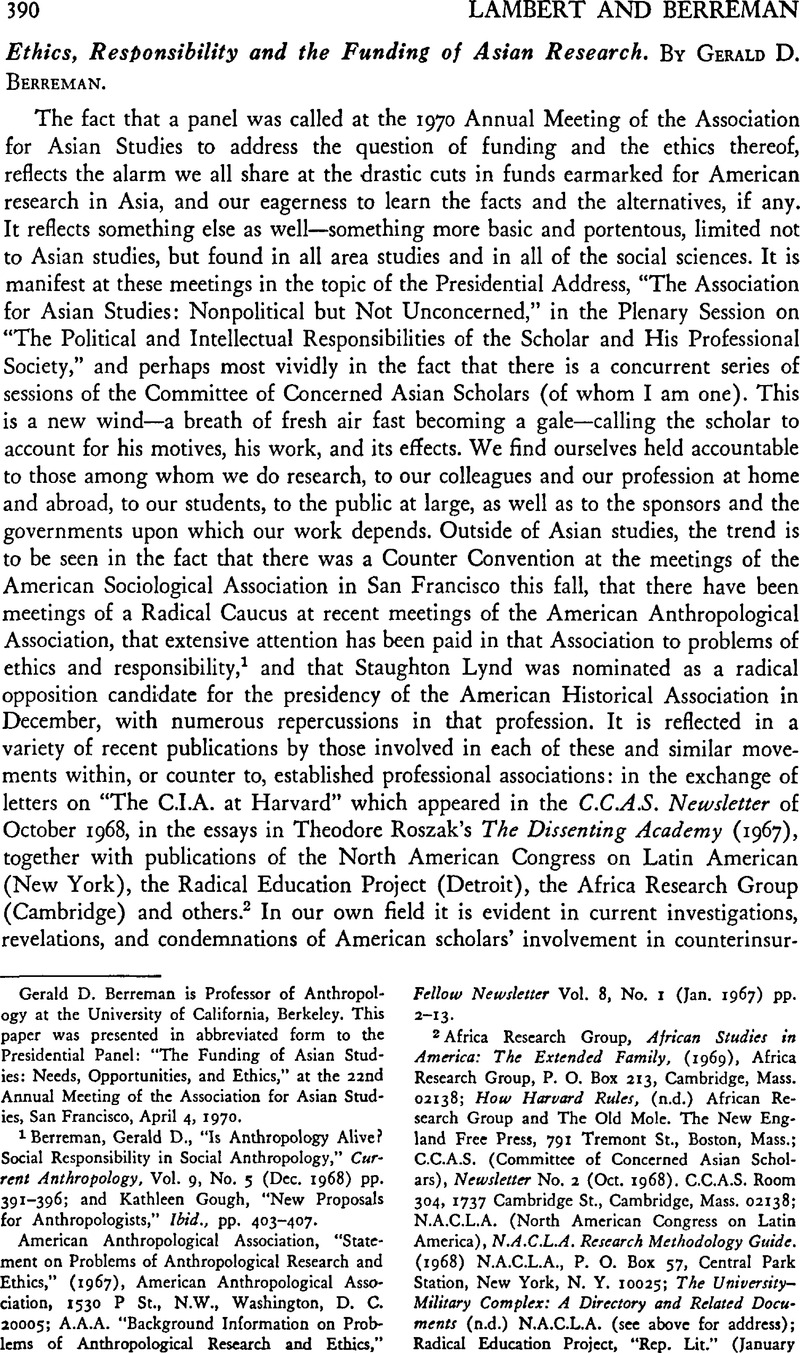Published online by Cambridge University Press: 23 March 2011

1 Berreman, Gerald D., “Is Anthropology Alive? Social Responsibility in Social Anthropology,” Current Anthropology, Vol. 9, No. 5 (Dec. 1968) pp. 391–396CrossRefGoogle Scholar; and Kathleen Gough, “New Proposals for Anthropologists,” Ibid., pp. 403–407.
American Andiropological Association, “Statement on Problems of Anthropological Research and Ethics,” (1967), American Anthropological Association, 1530 P St., N.W., Washington, D. C. 20005; A.A.A. “Background Information on Problems of Anthropological Research and Ethics,” Fellow Newsletter Vol. 8, No. 1 (Jan. 1967) pp. 2–13Google Scholar.
2 Africa Research Group, African Studies in America: The Extended Family, (1969), Africa Research Group, P. O. Box 213, Cambridge, Mass. 02138Google Scholar; How Harvard Rules, (n.d.) African Research Group and The Old Mole. The New England Free Press, 791 Tremont St., Boston, Mass.; C.C.A.S. (Committee of Concerned Asian Scholars), Newsletter No. 2 (Oct. 1968). C.C.A.S. Room 304, 1737 Cambridge St., Cambridge, Mass. 02138; N.A.C.L.A. (North American Congress on Latin America), N.A.C.L.A. Research Methodology Guide. (1968) N.A.C.L.A., P. O. Box 57, Central Park Station, New York, N. Y. 10025; The University Military Complex: A Directory and Related Documents (n.d.) N.A.C.L.A. (see above for address); Radical Education Project, “Rep. Lit.” (January 1970) Radical Education Project, P. O. Box 561-A, Detroit, Michigan 48232; Theodore, Roszak (editor), The Dissenting Academy, New York: Random House, 1967Google Scholar.
3 Coburn, Judith, “Project Cambridge: Another Showdown for Social Sciences?” Science, Vol. 166 Dec. 5, 1969) pp. 1250–1253.CrossRefGoogle ScholarPubMed
4 Africa Today Associates, “ASA: Crisis in African Studies,” Africa Today Vol. 16, Nos. 5 & 6 (Oct./Nov./Dec. 1969)Google Scholar. Africa Today Associates and Center on International Race Relations, University of Denver, Denver, Colo. 80210.
5 Burke, Fred G., “The Meaning of Montreal,” Africa Today, Vol. 16 (Oct./Nov./Dec. 1969), Nos. 5 & 6, p. 8Google Scholar.
6 Challenor, Sullivan, Herchclle, “No Longer at Ease: Confrontation at the 12th Annual African Studies Association Meetings at Montreal,” Africa Today, Vol. 16 (Oct./Nov./Dec. 1969) Nos. 5 & 6, 5Google Scholar.
7 If scholars in some Asian area specialties have largely avoided complicity in mission-oriented research while those in other areas have succumbed, it is perhaps less a tribute to the incorruptability of the former than a consequence of the relative absence of pressures and opportunities for them to be corrupted.
8 American Anthropological Association, “Statement on Problems of Anthropological Research and Ethics,” op. cit.
9 Coburn, op. cit., p. 1253.
10 National Herald, 1968, “Himalayan Blunder,” editorial) Aug. 7, 1968. New Delhi, IndiaGoogle Scholar.
11 See: Horowitz, Irving, The Rise and Fall of Project Camelot, (1968) Cambridge, M.I.T. Press.Google Scholar
12 Boffey, Philip, “Defense Research: Pressure on Social Sciences,” Science, Vol. 166 (May 30, 1969) p. 1037CrossRefGoogle Scholar.
13 Insurgent Sociologist, “Introduction: Prelude to Radical Commitment,” in Counter-Convention Call of the Insurgent Sociologist. (1969) Dept. of Sociology, University of California, Berkeley, p. 2Google Scholar.
14 Berreman, Gerald D., “Academic Colonialism, Not So Innocent Abroad,” The Nation, Nov. 10, 1969, p. 508. See also the various articles in the symposium, “Academic Colonialism” Seminar No. 112 (Dec. 1968) New Delhi, and: Saberwal, Satish, “International Social Science, Some Political Aspects,” Economic and Political Weekly, July 4, 1970, pp. 1044–1052 (Bombay)Google Scholar.
15 Kipphardt, Heinar, In the Matter of J. Robert Oppenheimer (trans, by Speirs, Ruth) Hill and Wang: New York, 1967, pp. 126–127Google Scholar.
16 Matthews, T. S., “James Agee: Strange and Wonderful,” Saturday Review, April 16, 1966, p. 23Google Scholar.